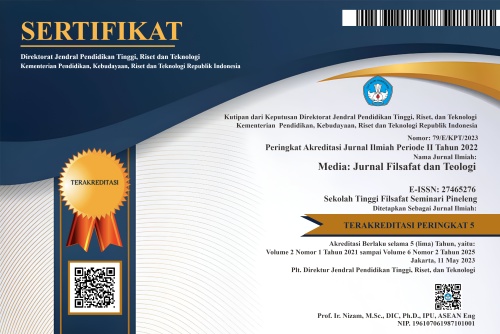Generasi Hamba Google: Saya Klik maka Saya Pintar
DOI:
https://doi.org/10.53396/media.v4i1.143Abstract
This paper aims to offer a critical discussion regarding the advancement of digital technology. The author directs attention to the so-called generation z who have lost control of using digital technology. The critical ideas offered aim to educate the younger generation, who live in a 'click' mentality and have become Google's slaves. This critical discussion also aims to build a critical and responsible intellectual attitude in the digital era. The author designed this research as a literature review. Amid the rapid advancement of digital technology, generation z must remain critical and not become a Google slave. Flexibility and adaptability in a changing world must be accompanied by an attitude of responsibility. They must have the ability to give value to their activities in digital technology. Technological literacy must be balanced with self-discovery. Literacy culture is a solution to achieve a critical awareness and an attitude of responsibility in dealing with advanced digital technology.
References
Alianti Rena dkk, “Pemanfaatan Google Maps Api pada Sistem Informasi Geografis Direktoris Perguruan Tinggi di Kota Bangkulu “Jurnal Bangkulu,Vol.2, No.2, Sepetember 2015.
https://m.liputan6.com/hot/read/4635797/apa-itu-Google-awal-mula-perkembangan-dan-fakta-menariknya>.
Arifatun Novia, “Kesalahan Penerjemah Teks Bahasa Indonesia ke Bahasa Arab melalui Google Tranlate”, Journal of Arabic Learning and Teaching, 2:2, Semarang: November 2012.
Hadirman F. Budi. Aku Klik maka Aku Ada, Yogyakarta: Kanisius, 2021.
Handayani Indry dkk, “Pemanfaatan Google Form sebagai Pendaftaran Tofel secara Online” Jurnal Teknoinfo, Vol,12, No.2, 2018.
Harsanto Budi, Inovasi Pembelajaran di Era Digital: Menggunakan Google Sites dan Media Sosial, Bandung: Unpad Pres, 2014.
Ismail A. Ilyas, Menggagas Paradigma Baru Dakwah Era Milenial, Jakarta: Kencana, 2018.
KWI Komkat, Katekese di Era Digital: Manusia dalam Revolusi Dgital, Yogyakarta: Kanisius, 2016.
Lenox C. John, Pandangan Kristen tentang Kecerdasann Buatan (Artificial Inteligence) dan Masa Depan Umat Manusia, Literatur Perkantas: Surabaya, 2020.
Makmur Testiani, Perpustakaan Era Keterbukaan Informasi Publik, Yogyakarta: Graha Ilmu, 2015.
Martin Rees, On The Future .Princeton, NJ: Princeton University Press, 2018.
Maskar Sugama & Wulantina Enda, “Persepsi Peserta Didik terhadap Metode Blended Learning dengan Google Classroom”, Jurnal Inovasi Matematika (Inomatika). Vol.I, No.2 2019.
Nungroho Catur, Cyber Societo: Teknologi, Media Baru, dan Dirupsi Informasi, Jakarta: Kencana, Desember 2020, Good I.J “Speculations Concerning the First Ultraintelligent Machine”, dalam Advances In Computers 6-6, F.L.Alt & M. Rubinoff, New York: Academic press, 1965.
Orong Yohanes, Pedoman Penulisan Karya Ilmiah, Maumere: Penerbit Ledalero, 2018.
Pawar R, Agrawal, Google search: Digging Intothe culture of, E-Discovery Tools and Applications in Modern Libraries: 2016.
Rio Adiwijaya, D., Techne as technology and Techne as Art: Heidegger’s phenomenological perspective, International Journal of Creative and Arts Studies, vol. 5, no. 1, 2018.
Sendari Anugerah Ayu “Sejarah Perkembangan Google dan Fakta-fakta Menariknya”, Liputan6.com, 19 Agustus 2021
Setyawan Bambang, “Pengembangan Media Google Site dalam Bimbingan Klasikal di SMAN 1 Sampung”, Jurnal Nusantara Of Research, Vol.2, No.6, 2019
Shaharanee, I. N. M., Jamil, J. M., & RodZi, S. S. M. Google Classroom as a Tool for Active Learning. Paper Presented at The AIP Conference Proceedings, February 2016, https://doi.org/10.1063/1.4960909.
Singh, D. A., & Dangmel, J. Understanding The Generation Z: The Future Workforce, South Asian Journal of Multidisciplinary Studies, vol. 5, no. 1, 2016.
Watimena A.A.Reza, Mendidik Manusia: Revolusi Pendidikan Abad 21, Jakarta: Gramedia, 2020.
Zaenal Ali, Buku Pintar Google, Jakarta: Mediakita 2011.
Downloads
Published
How to Cite
Issue
Section
License
Copyright (c) 2023 Maria Florentina Rumba, Yosafat Yulianus

This work is licensed under a Creative Commons Attribution 4.0 International License.













